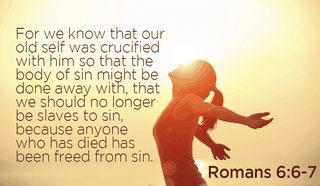- Recent Translations
- All Translations
Kehillah in Rome 6:20
Share
Settings
Kehillah in Rome 6:20 Meaning and Commentary
For when ye were the servants of sin
This is an argument used, or a reason given, why regenerate persons should be diligent in the service of righteousness; because when they were employed in the drudgery of sin, they
were free from righteousness;
they had no righteousness, nor were they desirous of any; yea, averse to it, threw off the yoke of the law of righteousness, and lived in a very unrighteous manner: hence may be observed what is the free will of man in an unregenerate state; not free to, but "from" righteousness; free enough to evil, but from all that is good; and also what obligation lies upon believers, who are delivered from the bondage of corruption, and the servitude of sin, to a life and service of righteousness; inasmuch as they were before free from it, and unconcerned about it, but are now made by the grace of God free to it, they ought therefore cheerfully to pursue it, and neglect no opportunity of performing it.
